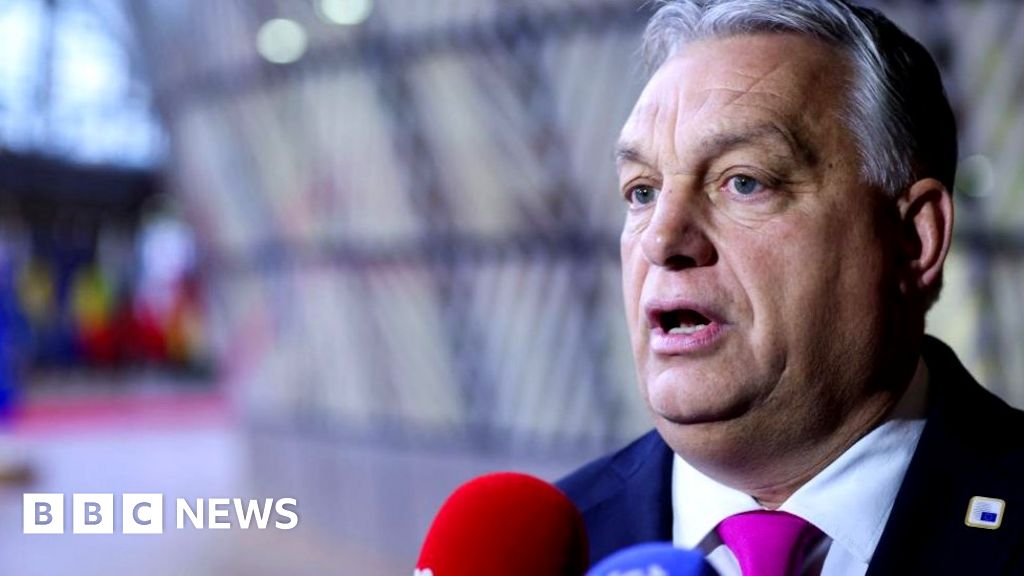- By Jaroslav Lukiv in London & Jessica Parker in Kyiv
- BBC News
Hungary has blocked €50bn ($55bn; £43bn) in EU aid for Ukraine – just hours after an agreement was reached on starting membership talks.
“Summary of the nightshift: veto for the extra money to Ukraine,” Hungarian Prime Minister Viktor Orban said after Thursday’s talks in Brussels.
EU leaders said Ukraine would not be left without support.
Ukraine is critically dependent on EU and US funding as it continues to fight occupying Russian forces.
Hungary – which maintains close ties with Russia – has long opposed membership for Ukraine but did not veto that move.
Mr Orban left the negotiating room momentarily in what officials described as a pre-agreed and constructive manner, while the other 26 leaders went ahead with the vote.
He told Hungarian state radio on Friday that he had fought for eight hours to stop his EU partners but could not convince them. Ukraine’s path to EU membership would be a long process anyway, he said, and parliament in Budapest could still stop it happening if it wanted to.
Talks on the financial package ended in the early hours of Friday. EU leaders said negotiations would resume early next year, reassuring Kyiv that support would continue.
Speaking later that day, European Council President Charles Michel said he was “confident and optimistic” the EU would fulfil its promise to support Ukraine.
Belgian Prime Minister Alexander De Croo echoed him: “The message to Ukraine is: we will be there to support you, we just need to figure out a few of the details together.”
Mr Michel had earlier confirmed that all but one EU leader had agreed on the aid package and wider budget proposals for the bloc – although Sweden still needed to consult its parliament. He vowed to achieve the necessary unanimity for the deal.
A long delay in financial aid for the country would cause big problems for Ukraine’s budget, Kyiv-based economist Sergiy Fursa told the BBC.
“It pays for all social responsibilities of the government – wages for teachers, doctors, for pensions,” he said.
Ukraine’s counter-offensive against Russia’s occupying forces ground to a halt at the start of winter, and there are fears that the Russians could simply outgun Ukraine.
On Thursday, President Putin mocked Ukraine and claimed Western “freebies” were running out.
Ukrainian President Volodymyr Zelensky was delighted by the EU’s announcement on the membership. “This is a victory for Ukraine. A victory for all of Europe. A victory that motivates, inspires and strengthens,” he said.
Ukrainian politician Kira Rudik added that “we were really elated” following the news about EU membership talks, but she said the feeling was now “bittersweet” because of the funding being blocked. “It is impossible to have a European future without winning the war,” she told the BBC.
Earlier this week, a senior Ukrainian official told the BBC that EU membership talks were more important that the €50bn because of the message it sends to both the Ukrainian people and Vladimir Putin.
Ukraine and neighbouring Moldova applied to join the EU after Russia launched its full-scale invasion of Ukraine in February 2022. They were both given candidate status last June, while Georgia was passed over at the time.
Moldovan President Maia Sandu said it was an honour to share the path to EU accession with Ukraine. “We wouldn’t be here today without Ukraine’s brave resistance against Russia’s brutal invasion,” she wrote.
She also told the BBC that Moldova’s ability to “stay part of the free world” depended on it being part of the EU.
German Chancellor Olaf Scholz praised his fellow leaders for showing a “strong sign of support”, adding that it was clear that both Ukraine and Moldova belonged to “the European family”.
A diplomat at the summit said it was Mr Scholz’s idea for Mr Orban to leave the room to enable the vote to go through.
The Hungarian leader later distanced himself from his colleagues with a video message on Facebook: “EU membership of Ukraine is a bad decision. Hungary does not want to participate in this bad decision.”
Mr Orban has also argued that Ukraine should not get large funds from the EU as it is not part of the bloc.
Talks on joining the EU can take years, so Thursday’s decision will not guarantee Ukraine membership.
EU candidate countries have to pass a series of reforms to adhere to standards ranging from the rule of law to the economy, although the EU’s executive has already praised Ukraine for completing more than 90% of the steps taken so far on justice and tackling corruption.
There are also other countries, aside from Hungary, who are sceptical about expanding the EU beyond the current 27.
And talk of expansion often comes alongside airy proposals for root-and-branch reform of a bloc that’s often unwieldy on far less fundamental issues.
But it’s still a boost for morale and comes just in time as Ukraine heads into a second winter following Russia’s full-scale invasion, and as the world’s attention is drawn elsewhere by war in the Middle East.

